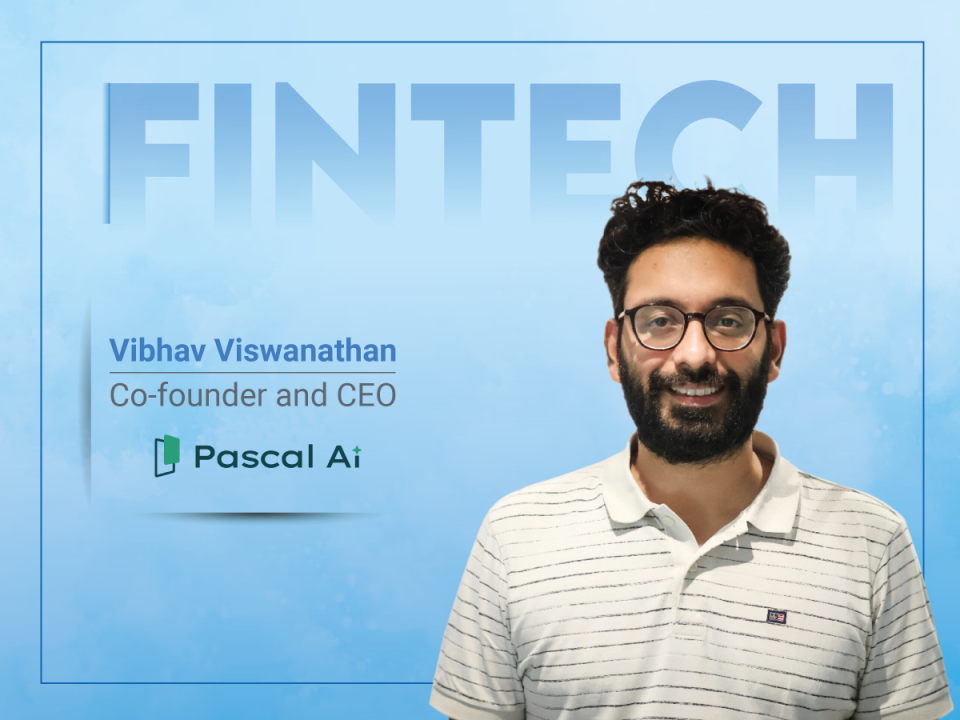Vibhav Viswanathan, Co-founder and CEO of Pascal AI comments on the changing global fintech ecosystem in this interview:
_______
Hi Vibhav, take us through your fintech journey and tell us about Pascal AI.
I started my career at the intersection of investing and AI/ML. At NEA-IndoUS Ventures and Capital Group, I worked on investing in private and public markets. At AWS, I worked on AWS Neuron and large-scale AI systems. That combination made me realize two things. First, investment teams are drowning in information. Second, the tools available to them don’t really capture institutional judgment — the tacit knowledge that makes an analyst or CIO effective.
A couple of lessons stand out from that journey:
- Always build with the end user in mind. Engineers and investors speak very different languages. You have to design products that bridge the two.
- Trust has to be a first principle. Security, provenance, and the ability to audit every conclusion are non-negotiable in financial research.
- Start vertically. Domain-specific problems need domain-specific workflows, and you get adoption only when you build with the realities of that industry in mind.
That’s what led me to start Pascal AI. We’re not trying to replace human judgment but to accelerate and deepen it.
Read More on Fintech : Global Fintech Interview with Shanthi Shanmugam, Co-founder and CEO, Casap
How is autonomous investment management and research enabling end users today?
Autonomy in research is not about replacing analysts with a black box. It’s about removing repetitive work and giving people better context so they can focus on the real judgment calls.
A few ways I’ve seen this help teams already:
- Automating data collection and synthesis saves hours of manual work.
- Continuous monitoring means analysts don’t have to chase quarterly reports or transcripts. The system highlights what has actually changed.
- Capturing institutional memory helps firms build consistency. New analysts can learn from years of deal history, rather than starting from scratch.
- Audit trails make compliance teams more comfortable with AI involvement because every insight can be traced back to a source.
My advice: Adopt it step by step. Start with a single, clear workflow, such as transcript summarization or KPI extraction. Let humans give feedback. That builds both quality and trust over time.
Tell us about your latest funding round and how it will impact near-term product plans.
We recently closed our seed round, which provides us with the resources to double down on a few key areas of focus.
The first is enterprise integrations. Firms need secure, reliable connectors into the data they already use — custodians, data vendors, internal repositories. That means building more native connectors and flexible deployment options so sensitive data can stay within their environment.
The second is governance and auditability. Every automated action has to be explainable and tied back to a source. That’s critical for compliance and for building trust within organizations.
One lesson I’ve learned: it’s better to build one deep workflow and make it excellent than to spread thin across many features. We’re focusing on outcomes that save real time, reduce errors, and can be measured clearly.
What about the current state of fintech excites you the most?
Three things stand out to me:
- Composability of tools. Vendors and platforms are finally exposing APIs that allow startups to integrate deeply. That accelerates innovation.
- Operationalized AI. The shift from models that answer a point-in-time query to models embedded in daily workflows is making adoption real.
- Constructive regulation. Regulators and enterprises are starting to talk about how to certify and govern models instead of fearing them. That’s a big step forward.
For founders, the lesson is simple: design for interoperability and governance from the start. For investors, it’s about backing companies solve daily operational pain points, not just theoretical use cases.
How is AI impacting the global fintech market?
AI’s impact is best seen in processes rather than headlines.
- It creates operational leverage by automating the data work that eats up analyst time.
- It augments human decision-making by surfacing contrarian evidence and quantifying uncertainty.
- It enables new products altogether, like continuous due diligence or automated covenant monitoring.
- It forces tighter coupling with compliance, since governance and explainability have to move at the same pace as adoption.
For teams adopting AI, I recommend instrumenting everything. Log inputs, outputs, feedback, and outcomes. Without that, you can’t measure quality or drift.
What are your thoughts on the future of fintech?
The future is going to be pragmatic and composable.
- The products that win will be the ones that deliver measurable outcomes, such as time saved, reduced errors, or improved decisions.
- Human-plus-AI workflows will become the default. The best tools will keep people at the center while letting AI scale their reach.
- Trust will become the real competitive moat. Security, provenance, and auditability will drive adoption more than features.
- With capital flowing globally, fintech products will have to adapt to local regulations and market structures by design.
My closing thought: focus on building a few workflows that truly matter, measure the outcomes, and refine them based on user feedback. That’s how you build adoption and lasting trust.
Catch more Fintech Insights : AI-Driven Inclusive Fintech: Globalizing Access through Intelligent Finance
[To share your insights with us, please write to psen@itechseries.com ]

Pascal AI develops “agentic” AI platforms specifically for the investment management industry. Its technology automates complex investment workflows by combining institutional financial expertise with advanced machine intelligence.
Vibhav is a Chicago Booth graduate with over a decade of experience across investment management and technology. With investment experience at NEA-IndoUS Ventures & Capital Group and AI product development at AWS and MPL, he brings a unique combination of experience in investing and AI product development. Having seen firsthand how information asymmetry and manual processes slow down high-stakes decisions, Vibhav founded Pascal AI to give investors a sharper edge through AI-powered insights.
